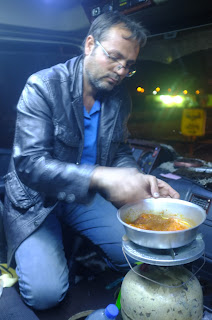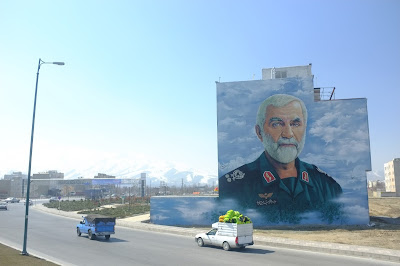 |
| Oasis |
Camels, sweatshirts and manure
We bought several cans of beans and bread, filled our water bottles and got ready for a two-day long crossing. We camped on the outskirts of the last city before the desert and woke up early in the morning. We had already noticed that Iranians hold a siesta in the early afternoon - around 1 PM everything is closed and deserted and there are fewer cars than usually. And the next day, there could be no trucks whatsoever because of the Nowruz holiday. We really wanted to start hitchhiking before that.
 |
| Putting backpacks on a truck |
Worries again showed as unnecessary, though. Maybe the fifth truck Vojta was waving at stopped and brought us to a nearby village. (Even though there were sand plains with just few crampled shrubs up to the horizon, there still were villages with houses made of bricks and mud.) Our driver stopped at a shop with a couple of guys wearing sweatshirts even though it was almost 30 centigrades, and immediately referred us to another driver who was parking nearby. We had to put our backpacks on the load since there was no more room in the cabin, and then we continued towards the real desert.
From time to time, we would see a roadsign warning drivers against camels, and sometimes we would even see camels themselves. Even thought the driver first told us that he was going to the first big town in the middle of the desert, it later revealed that he was crossing the whole desert. And he agreed to take us with him all the way. (I'm not sure what was his name anymore but let's call him Muhammad.)
At noon, he stopped at a petrol station in an oasis. (There really were palm trees, a small river and all.) It was not deadly hot, but it was hot enough for me to give up the turkish cap under my headscarf. (People having picknicks on carpets around still were wearing sweatshirts or looked quite happy in black chadors or thick coats.) We wanted to eat beans from a can but Muhammad didn't let us and invited us for a kebap with rice instead.
 |
| Iranian dresscode for 30°C |
We made about 800 km that day and we got way further than expected. At 2 AM, our driver shared heated fish and eggplant cans with us at a petrol station (and when we stopped paying attention to our garbage bag, he dumped it into a ditch next to a garbage container). Then we went to camp nearby. We slept something like 4 hours because Muhammad wanted to continue very early in our direction. Since we were all the time speaking Farsi (even though calling it like that is a bit too ambitious), we weren't sure where exactly he would continue.
So the next morning we found ourselves in a pistaccio orchard, waiting several hours for the truck to unload. We also found out that the thing our driver had been transporting across the whole Iran was dung.
There was another truck, too, and we were trying to speak with both drivers over the dictionary. Contrarily to other people, they knew how to search words in it, so our conversation was moderately succesful. We learnt a couple of new words in Farsi and tought Muhammad and his friend some in English.
 |
| Approaching the desert |
In the late afternoon, Muhammad drove us out of the city and then he had to wait because of a Nowruz limitation on trucks. So we had to say goodbye to him and to hitchhike on. Most of the cars were packed by families but the Iranian hospitality didn't let us down. In a couple of minutes, we were on our way on.
Our driver spoke a little bit English. It was good enough for telling us that he hated the current regime and that he preferred the previous one. For the rest of the yourney, we were watching videos with the shah.
In the evening, we almost reached the Persian Gulf. The weather didn't care it still was just March. It was hot and humid like in the middle of the European summer. I was rather sorry in my hijab that I wasn't a guy or that Islam wasn't invented in places like Siberia or Greenland instead.
Nowruz eggs
Our hosts (let's call them Hossein and Sabereh) have very active little kids, and if there were a World Cup in parenting, I think they could compete for medals. Even though they were all the time busy taking care of the kids, they didn't mind having us around and taking care of us too. And over the couple of days we've been with them, they never looked stressed, never raised their voice to the children or complained when they had slept for just several hours. (A couple of times, one of us was given a kid to carry her somewhere in our arms, and especially for Vojta the heartless it was a particularly challenging mission.)
It was especially funny to watch Sabereh trying to pray. It looked more like some kind of a Zen patience exercise. For praying, one needs a chador. And chador is something very interesting you just totally need to have if you are a little kid. So they would always come and pull her by the the chador, they woud steal the praying beads, the stone one puts her forhead on or the little rug. Sabereh would never lose temper. She would always finish a part of her prayer, then take all the stolen things back and then continue. This then would repeat several times.
I visited with Sabereh and the children a birthday party of their friends' kids (guys were not allowed to go there, so they were having a nap instead) and then we were preparing the New Year's celebration.
One of the important Nowruz traditions is to make a so called Haft Sin. It looks like an altar, and it basically means putting several things starting with an "S" on the table, and also some things that don't start with an "S". Each of them symbolises something related to spring and life regaining its strength and there should be seven of them. There usually is a mirror (it symbolises light), fresh grass (for growth), some kind of sweet jam (for I don't know what), garlic (for I also don't know what), colored eggs (for new life) and some other things I don't remember. Some people put coins instead of garlic. Some people also put a small living fish in a bowl. (Sabereh says she doesn't like that because the fish always dies soon.)
 |
| Nowruz fish |
Our friends approached Nowruz with a particular tranquility, like everything. They didn't make any hectic or stressful preparations, and started making their Haft Sin in the morning of the Nowruz day. They also let us take part - we were supposed to color the eggs. So we were making Easter eggs in Iran (for me, it was the first time in maybe ten years since I hate the most popular Czech Easter traditions).
At noon, the year 1396 started. At the celebration, people put fancy clothes on (we tried to wear the ones with the fewest holes) and sometimes they give each other presents. Also banknotes are given as presents (the kids immediately tried to eat the ones they got).
 |
| Nowruz Easter eggs (I'm especially proud of the one with eyes) |
 |
| A Haft Sin |
After the Nowruz day, our friends took us to several short family visits, showed us their city (there was a lot to see) and helped us cook a Czech meal. We were discussing with Hossein political systems with our countries and realized that there was actually a lot of things we didn't know about our system (such as which state body is controlled by which).
When we were leaving, we knew that we would miss our new friends like we already missed all those we had met before.
 |
| A water tank |
 |
| An old bath |











